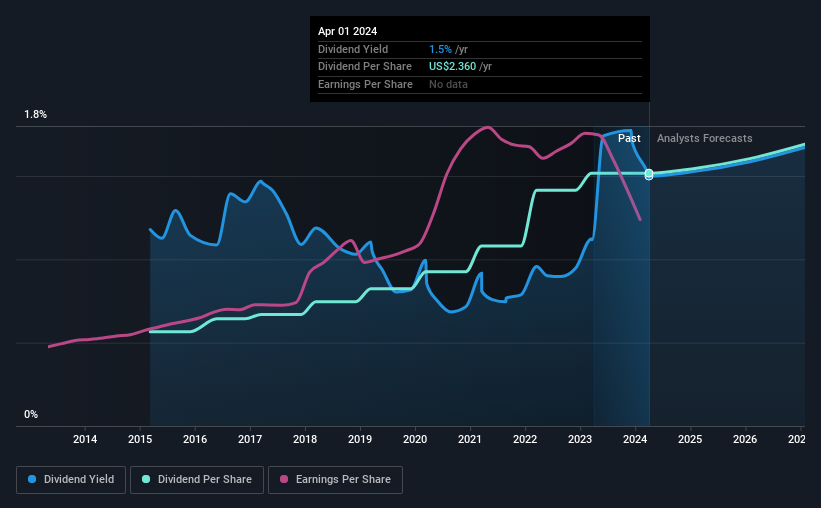- United States
- /
- Food and Staples Retail
- /
- NYSE:DG
Dollar General (NYSE:DG) Has Announced A Dividend Of $0.59

Dollar General Corporation (NYSE:DG) has announced that it will pay a dividend of $0.59 per share on the 23rd of April. This means that the annual payment will be 1.5% of the current stock price, which is in line with the average for the industry.
See our latest analysis for Dollar General
Dollar General's Dividend Is Well Covered By Earnings
We like to see a healthy dividend yield, but that is only helpful to us if the payment can continue. However, prior to this announcement, Dollar General's dividend was comfortably covered by both cash flow and earnings. As a result, a large proportion of what it earned was being reinvested back into the business.
Over the next year, EPS is forecast to expand by 22.0%. If the dividend continues along recent trends, we estimate the payout ratio will be 29%, which is in the range that makes us comfortable with the sustainability of the dividend.

Dollar General Doesn't Have A Long Payment History
Dollar General's dividend has been pretty stable for a little while now, but we will continue to be cautious until it has been demonstrated for a few more years. Since 2015, the annual payment back then was $0.88, compared to the most recent full-year payment of $2.36. This means that it has been growing its distributions at 12% per annum over that time. The dividend has been growing rapidly, however with such a short payment history we can't know for sure if payment can continue to grow over the long term, so caution may be warranted.
The Dividend's Growth Prospects Are Limited
The company's investors will be pleased to have been receiving dividend income for some time. Earnings have grown at around 4.8% a year for the past five years, which isn't massive but still better than seeing them shrink. While growth may be thin on the ground, Dollar General could always pay out a higher proportion of earnings to increase shareholder returns.
Our Thoughts On Dollar General's Dividend
Overall, we think Dollar General is a solid choice as a dividend stock, even though the dividend wasn't raised this year. The payout ratio looks good, but unfortunately the company's dividend track record isn't stellar. This looks like it could be a good dividend stock going forward, but we would note that the payout ratio has been at higher levels in the past so it could happen again.
Market movements attest to how highly valued a consistent dividend policy is compared to one which is more unpredictable. Still, investors need to consider a host of other factors, apart from dividend payments, when analysing a company. Taking the debate a bit further, we've identified 2 warning signs for Dollar General that investors need to be conscious of moving forward. Looking for more high-yielding dividend ideas? Try our collection of strong dividend payers.
New: Manage All Your Stock Portfolios in One Place
We've created the ultimate portfolio companion for stock investors, and it's free.
• Connect an unlimited number of Portfolios and see your total in one currency
• Be alerted to new Warning Signs or Risks via email or mobile
• Track the Fair Value of your stocks
Have feedback on this article? Concerned about the content? Get in touch with us directly. Alternatively, email editorial-team (at) simplywallst.com.
This article by Simply Wall St is general in nature. We provide commentary based on historical data and analyst forecasts only using an unbiased methodology and our articles are not intended to be financial advice. It does not constitute a recommendation to buy or sell any stock, and does not take account of your objectives, or your financial situation. We aim to bring you long-term focused analysis driven by fundamental data. Note that our analysis may not factor in the latest price-sensitive company announcements or qualitative material. Simply Wall St has no position in any stocks mentioned.
About NYSE:DG
Dollar General
A discount retailer, provides various merchandise products in the southern, southwestern, midwestern, and eastern United States.
Undervalued established dividend payer.


